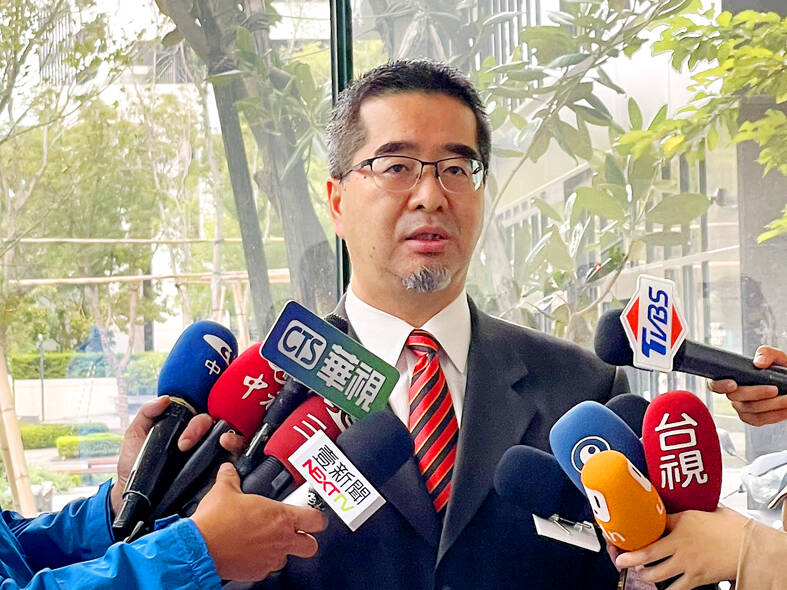The government would impose an administrative penalty on the Ma Ying-jeou Foundation following foundation chief executive Hsiao Hsu-tsen’s (蕭旭岑) “one China” remarks last week, a source said yesterday.
A Chinese student delegation visited Taiwan from Nov. 27 to Thursday last week. The delegation, comprising 40 students including Chinese table tennis champion Ma Long (馬龍), was invited to Taiwan by the foundation to participate in cross-strait exchanges.
Song Siyao (宋思瑤), a Fudan University student, on Dec. 1 referred to Team Taiwan as “China, Taipei” as she congratulated them for their victory in the WBSC Premier12.

Photo: Lin Hsin-han, Taipei Times
She also said the group hopes that “mainland China and Taiwan compatriots can be like the team Chinatrust Brothers and work together for the motherland to take baseball to a higher level.”
Hsiao has said Song’s reference to “China Taipei” could be replaced with “China Taiwan” given that “the Zhonghua Minguo Taiwan (中華民國台灣) used by former president Tsai Ing-wen (蔡英文) and President William Lai (賴清德) is same as ’China Taiwan’ because Zhonghua Minguo (中華民國, the Republic of China) is Zhongguo (中國, China).”
A source yesterday on condition of anonymity said that a political campaign for “one China” during cross-strait exchanges could contravene Paragraph 1, Article 16 of Regulations on Permission for Entrance of People of the Mainland Area Into the Taiwan Area (大陸地區人民進入臺灣地區許可辦法).
The authorities may ban the wrongdoers from cross-strait exchanges for half a year to five years, the source said.
Hsiao’s remarks “fueled the fire,” they said.
The foundation is the organizer of the trip and should have obeyed the law and a letter of understanding by refraining from political activities, they said.
Neither the delegation nor the foundation was allowed to conduct political activities during exchanges, but Hsiao polarized society by continually criticizing the Democratic Progressive Party (DPP), the students’ parents and people who think differently, they said.
The Chinese student’s reference to “China, Taipei” denied Taiwan’s status, but she has been condemned, and no further actions would be taken, as she is just a student, the source said.
However, Hsiao fueled the fire by referring to the national team as “China, Taiwan,” which was against the purpose of cross-strait exchanges and punitive measures would be taken, they said.
The foundation may promote its political beliefs on platforms that are not relevant to cross-strait exchanges, and all activities should be done in compliance with regulations, they said.
The National Immigration Agency, the Mainland Affairs Council and the Ministry of Education would convene a meeting to discuss an administrative penalty on the foundation, they said.
Hsiao yesterday said that DPP politicians and the party’s “cyberwarriors” have been polarizing society by bullying Song and spreading disinformation.
Taiwanese spontaneously welcomed the delegation wherever they went during their visit, showing that most people embraced cross-strait exchanges, he said.
The DPP could not extinguish their enthusiasm by oppressing or bullying different voices, or demonizing them as Chinese communists, he said.
It is disgraceful that the DPP and its supporters have demonizad a non-governmental organization dedicated to promoting cross-strait exchanges, he added.
Additional reporting by Lin Hsin-han and CNA

A magnitude 6.4 earthquake struck off the coast of Hualien County in eastern Taiwan at 7pm yesterday, the Central Weather Administration (CWA) said. The epicenter of the temblor was at sea, about 69.9km south of Hualien County Hall, at a depth of 30.9km, it said. There were no immediate reports of damage resulting from the quake. The earthquake’s intensity, which gauges the actual effect of a temblor, was highest in Taitung County’s Changbin Township (長濱), where it measured 5 on Taiwan’s seven-tier intensity scale. The quake also measured an intensity of 4 in Hualien, Nantou, Chiayi, Yunlin, Changhua and Miaoli counties, as well as

Taiwan is to have nine extended holidays next year, led by a nine-day Lunar New Year break, the Cabinet announced yesterday. The nine-day Lunar New Year holiday next year matches the length of this year’s holiday, which featured six extended holidays. The increase in extended holidays is due to the Act on the Implementation of Commemorative and Festival Holidays (紀念日及節日實施條例), which was passed early last month with support from the opposition Chinese Nationalist Party (KMT) and Taiwan People’s Party. Under the new act, the day before Lunar New Year’s Eve is also a national holiday, and Labor Day would no longer be limited

COMMITMENTS: The company had a relatively low renewable ratio at 56 percent and did not have any goal to achieve 100 percent renewable energy, the report said Pegatron Corp ranked the lowest among five major final assembly suppliers in progressing toward Apple Inc’s commitment to be 100 percent carbon neutral by 2030, a Greenpeace East Asia report said yesterday. While Apple has set the goal of using 100 percent renewable energy across its entire business, supply chain and product lifecycle by 2030, carbon emissions from electronics manufacturing are rising globally due to increased energy consumption, it said. Given that carbon emissions from its supply chain accounted for more than half of its total emissions last year, Greenpeace East Asia evaluated the green transition performance of Apple’s five largest final

Taiwan is to extend its visa-waiver program for Philippine passport holders for another year, starting on Aug. 1, Minister of Foreign Affairs Lin Chia-lung (林佳龍) said on Friday. Lin made the announcement during a reception in Taipei marking the 127th anniversary of Philippine independence and the 50th anniversary of the establishment of the Manila Economic and Cultural Office (MECO) in Taiwan, the Ministry of Foreign Affairs said. The decision reflected Taiwan’s commitment to deepening exchanges with the Philippines, the statement cited Lin as saying, adding that it was a key partner under the New Southbound Policy launched in 2016. Lin also expressed hope